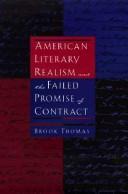| Listing 1 - 2 of 2 |
Sort by
|

ISBN: 0520206479 0520216644 0585082391 Year: 1997 Publisher: Berkeley ; Los Angeles ; London University of California Press
Abstract | Keywords | Export | Availability | Bookmark
 Loading...
Loading...Choose an application
- Reference Manager
- EndNote
- RefWorks (Direct export to RefWorks)
Contracten in de literatuur --- Contracts in literature --- Contrats dans la littérature --- Droit dans la littérature --- Law in literature --- Littérature réaliste --- Neorealism (Literature) --- Neorealisme (Literatuur) --- Néoréalisme (Littérature) --- Promise (Law) in literature --- Realism (Literary movement) --- Realism in literature --- Realisme (Letterkundige beweging) --- Realisme (Literaire beweging) --- Realisme in de literatuur --- Realistische literatuur --- Recht in de literatuur --- Réalisme (Mouvement littéraire) --- Réalisme dans la littérature --- Social ethics in literature --- Social status in literature --- Sociale positie in de literatuur --- Statut social dans la littérature --- American fiction --- Contracts in literature. --- Law in literature. --- Literature and society --- Promise (Law) in literature. --- Realism in literature. --- Social ethics in literature. --- Social status in literature. --- History and criticism. --- History --- 19th century --- History and criticism --- United States --- Contracts --- Twain, Mark --- Criticism and interpretation --- James, Henry --- Chopin, Kate O'Flaherty --- Chesnutt, Charles Waddell --- Hay, John Milton --- Lynde, Francis --- Tourgee, Albion Winegar --- Phillips, David Graham --- Phelps, Elizabeth Stuart
Book
ISBN: 1282710702 9786612710704 0226294153 9780226294155 9780226294131 0226294137 9781282710702 Year: 2010 Publisher: Chicago University of Chicago Press
Abstract | Keywords | Export | Availability | Bookmark
 Loading...
Loading...Choose an application
- Reference Manager
- EndNote
- RefWorks (Direct export to RefWorks)
How did slavery and race impact American literature in the nineteenth century? In this ambitious book, Michael T. Gilmore argues that they were the carriers of linguistic restriction, and writers from Frederick Douglass to Stephen Crane wrestled with the demands for silence and circumspection that accompanied the antebellum fear of disunion and the postwar reconciliation between the North and South. Proposing a radical new interpretation of nineteenth-century American literature, The War on Words examines struggles over permissible and impermissible utterance in works ranging from Thoreau's "Civil Disobedience" to Henry James's The Bostonians. Combining historical knowledge with groundbreaking readings of some of the classic texts of the American past, The War on Words places Lincoln's Cooper Union address in the same constellation as Margaret Fuller's feminism and Thomas Dixon's defense of lynching. Arguing that slavery and race exerted coercive pressure on freedom of expression, Gilmore offers here a transformative study that alters our understanding of nineteenth-century literary culture and its fraught engagement with the right to speak.
American literature --- Slavery in literature. --- Race in literature. --- Literary style --- Slavery and slaves in literature --- Slaves in literature --- Literature --- Style, Literary --- Language and languages --- Rhetoric --- History and criticism. --- Social aspects --- Style --- 19th century --- History and criticism --- 20th century --- Slavery in literature --- Race in literature --- Style [Literary ] --- United States --- Emerson, Ralph Waldo --- Criticism and interpretation --- Thoreau, Henry David --- Fuller, Margaret --- Hawthorne, Nathaniel --- Stowe, Harriet Elizabeth Beecher --- Douglass, Frederick --- Whitman, Walt --- Melville, Herman --- Tourgee, Albion Winegar --- James, Henry --- Twain, Mark --- Crane, Stephen --- Chesnutt, Charles Waddell --- Dixon, Thomas --- Enslaved persons in literature --- slavery, race, literature, frederick douglass, stephen crane, silence, antebellum, disunion, america, reconciliation, utterance, henry james, thoreau, civil disobedience, bostonians, freedom, expression, rhetoric, speaking, voice, lynching, thomas dixon, speech, feminism, margaret fuller, cooper union, lincoln, hawthorne, dissent, whitman, melville, stowe, twain, chestnutt, racism, indian question, jackson, tourgee, bartleby, billy budd, politics, history.
| Listing 1 - 2 of 2 |
Sort by
|

 Search
Search Feedback
Feedback About UniCat
About UniCat  Help
Help News
News